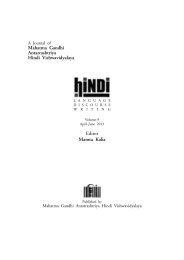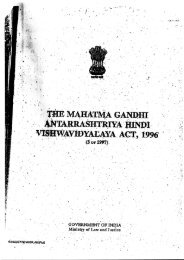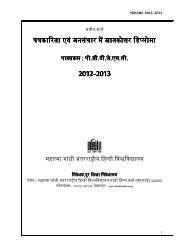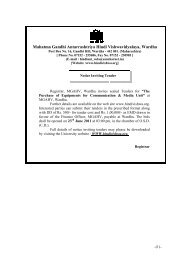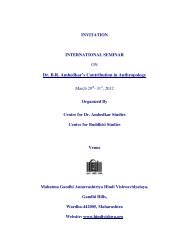Mamta Kalia
Mamta Kalia
Mamta Kalia
Create successful ePaper yourself
Turn your PDF publications into a flip-book with our unique Google optimized e-Paper software.
perpetuation of dissensus – on a<br />
permanent crisis in representation, on<br />
an ever-greater awareness of the<br />
contingent and localised- the unstablenature<br />
of all norms for representing the<br />
world. If we take a critical view of<br />
consensus and dissensus, we find that<br />
these are two poles (black and white)<br />
but the social reality often lies in between<br />
(grey): there may be ‘consensual<br />
dissensus’ (of low, medium or high degree)<br />
or ‘dissensual consensus’ (of low, medium<br />
or high degree). That is, there is nothing<br />
like absolute consensus or absolute<br />
dissensus. In Indian context often the<br />
consensus is achieved through<br />
suppression of the marginalized people’s<br />
voice either by domination (force) or<br />
by cultural hegemony( consent), hence<br />
it is less democratic and less<br />
emancipatory. On the other hand,<br />
dissensus implies to be more democratic<br />
and more emancipatory because the<br />
voice of the marginalized people has<br />
an autonomous space for expression of<br />
world views.<br />
Further, for anti-thetical radicalism<br />
of Robert Rorty, there is a need for<br />
a ‘detheoreticised sense of community’.<br />
He finds Lyotard right in his rejection<br />
of meta-narratives and of Habermas’<br />
‘universalistic philosophy’ (search for<br />
communicative rationality) but, on the<br />
other hand, he finds Habermas right in<br />
his insistence on ‘liberal politics’ that<br />
post –modernists want to abandon in<br />
order to avoid universalistic philosophy.<br />
But this is an ambivalence of Rorty<br />
because for a detheoreticised sense of<br />
community, one has to go beyond liberal<br />
politics of civil liberties to emancipatory<br />
politics of inclusion and diversity.<br />
Baudrillard thinks that all repressive<br />
and reductive strategies of power systems<br />
are already present in the internal logic<br />
of the sign, as well as those of exchange<br />
value and political economy. Therefore,<br />
to restore meaning (symbol) is a ‘total<br />
revolution’ (not to be confused with<br />
Jaiprakash Narayan’s terms)- but it is<br />
not the proletariat’s revolution. This<br />
radical anti-representation and his<br />
subordination of political economy of<br />
the sign (based on consumption) led him<br />
to dissociate from his earlier Marxism.<br />
Since Marxism is still associated with<br />
‘western rationalism’, to Baudrillard, it<br />
is only “a limited petite bourgeois critique,<br />
one more step in the banalisation of<br />
life toward the ‘good use’ of the social”.<br />
He clearly observes that the concept<br />
of mode of production now gives way<br />
to a ‘mode of signification’ that, in turn,<br />
is controlled by the ‘code’. He is of<br />
the view that the mass media prevent<br />
communication because of their very<br />
form. In the first order of ‘simulacra’–<br />
period from renaissance to the industrial<br />
revolution- the value was still ‘natural’<br />
(grounded) but in the second order (of<br />
industrial era) value was commercial–<br />
based on exchange. In the third order,<br />
at present (post- industrial era), an order<br />
of differential value of sign- of ‘simulation’is<br />
controlled by the ‘code’. Now,<br />
especially through electronic media the<br />
April-June 2010 :: 75



